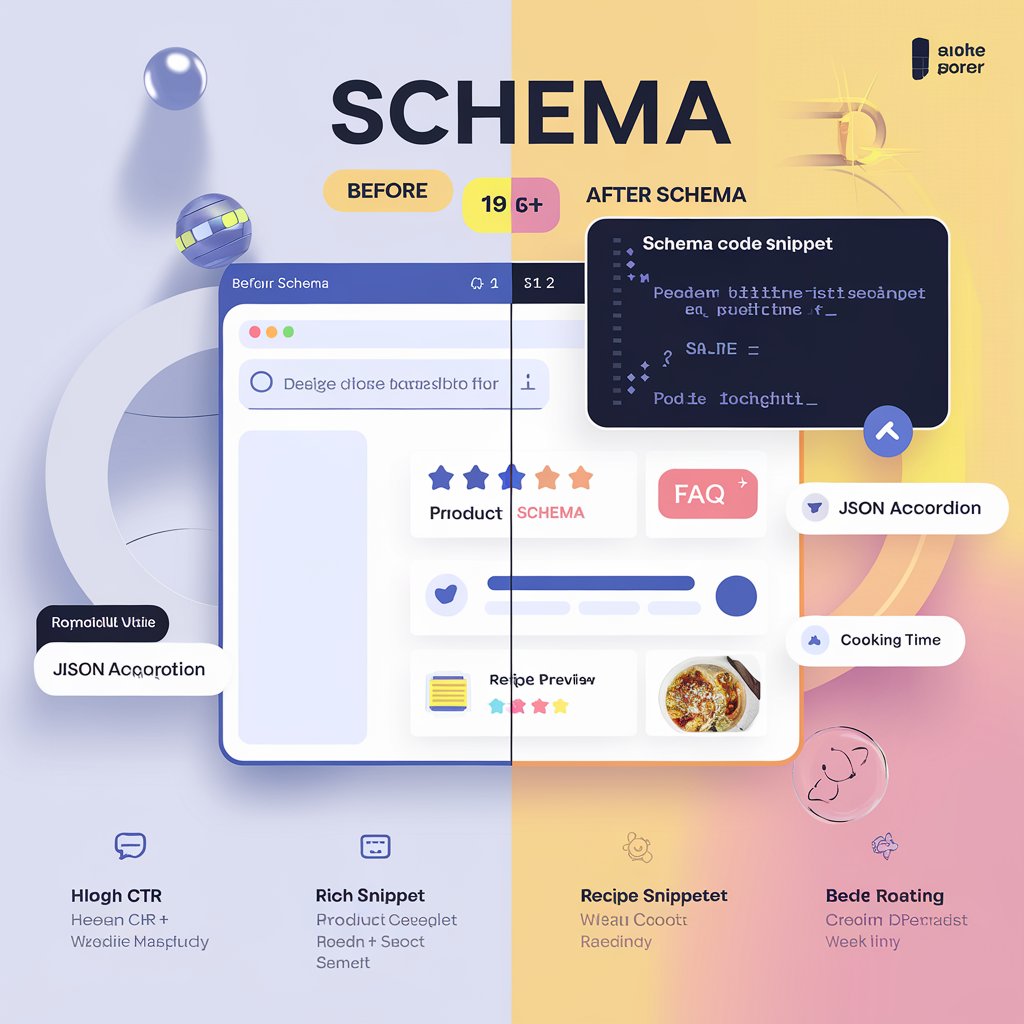Introduction
Imagine typing “best chocolate chip recipe” into Google and instantly seeing star ratings, cooking times, and calorie counts right on the search results page. That’s the power of schema markup—a behind-the-scenes SEO superhero that helps search engines understand and showcase your content better.
But what exactly is schema markup, and why should you care? In this guide, we’ll break down schema markup in plain language, explain how it impacts SEO, and show you how to implement it to outrank competitors.

What is Schema Markup?
Schema markup (or structured data) is a type of code added to your website to help search engines like Google, Bing, and Yahoo interpret your content. Think of it as a translator that tells search engines:
- What your page is about (e.g., a product, article, event, or FAQ).
- Key details (e.g., price, date, author, ratings).
Developed through a collaborative project called Schema.org, this standardized vocabulary ensures all search engines “speak the same language” when crawling your site.
Schema Markup Example
If you run an online bakery, adding schema markup to a product page might look like this:
<script type="application/ld+json">
{
"@context": "https://schema.org",
"@type": "Product",
"name": "Chocolate Cake",
"image": "cake.jpg",
"description": "Decadent triple-layer chocolate cake...",
"offers": {
"@type": "Offer",
"price": "39.99",
"priceCurrency": "USD"
}
}
</script>
This code helps Google display your cake’s price, image, and description directly in search results.
Why Schema Markup Matters for SEO
While schema markup isn’t a direct ranking factor, it indirectly boosts SEO performance by:
- Enabling Rich Snippets
Schema markup helps your content stand out with eye-catching rich snippets—enhanced search results that include:- Star ratings (for products, recipes, or businesses).
- Event dates, prices, or ticket availability.
- FAQ answers, how-to steps, or video previews.
- Improving Click-Through Rates (CTR)
Rich snippets take up more screen space and provide immediate value, making users more likely to click. For instance, a product with a 4.5-star rating will outperform a plain blue link. - Clarifying Context for Search Engines
Schema markup eliminates guesswork. If your page reviews “Apple Watch vs. Samsung Galaxy,” schema tells Google it’s a comparison article—not a product page. - Future-Proofing for Voice Search & AI
As voice search and AI tools like ChatGPT grow, structured data helps machines extract precise answers. For example, “Hey Google, find vegan restaurants near me” relies on schema markup to pull hours, ratings, and menus.
Types of Schema Markup
Schema.org offers hundreds of categories, but these are the most impactful for SEO:
- Article/Blog Post
Highlights the author, publish date, and headline. - Product
Displays price, availability, and reviews. - Local Business
Shares address, phone number, and opening hours. - Event
Promotes dates, locations, and ticket details. - FAQ
Shows questions and answers directly in search results. - Recipe
Features cooking time, calories, and ratings.

How to Implement Schema Markup
Adding schema markup is simpler than you think. Here’s a step-by-step guide:
Step 1: Choose Your Schema Type
Visit Schema.org and pick the schema that matches your content (e.g., “Product,” “Article”).
Step 2: Generate the Code
Use free tools like:
- Google’s Structured Data Markup Helper (user-friendly for beginners).
- Mercury’s Schema Generator (for JSON-LD, the recommended format).
Step 3: Add the Code to Your Website
Embed the JSON-LD script in the <head> or <body> section of your HTML. Most CMS platforms like WordPress have plugins (e.g., Rank Math, Yoast) to automate this.
Step 4: Test Your Markup
Validate your code with Google’s Rich Results Test. Fix any errors flagged by the tool.
Common Schema Markup Mistakes to Avoid
- Using the Wrong Schema Type: Don’t label a blog post as a “Product.”
- Incomplete Data: Missing fields like “price” or “date” limit rich snippet potential.
- Spamming: Overloading irrelevant markup can harm credibility.
FAQ About Schema Markup
Q: Does schema markup guarantee a rich snippet?
A: No—Google decides which pages get rich snippets, but schema markup increases your chances.
Q: Is JSON-LD the only format?
A: While JSON-LD is Google’s preferred format, you can also use Microdata or RDFa.
Q: How long does it take to see results?
A: It depends on how quickly Google crawls your site. Monitor performance via Google Search Console.
Conclusion
Schema markup is like giving search engines a VIP tour of your website. By clearly explaining your content’s purpose, you unlock rich snippets, higher CTRs, and better user experiences. Whether you’re selling products, publishing blogs, or promoting events, structured data ensures you don’t get lost in the SEO noise.
Would you be ready to level up? Add schema markup to your most important pages, and watch your search visibility soar!